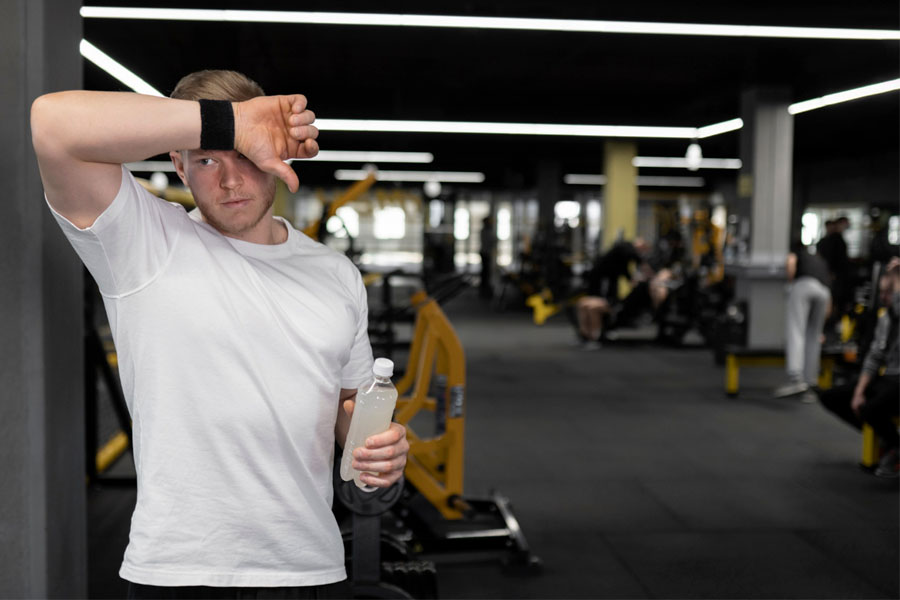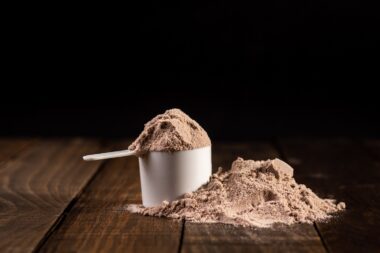Bodybuilding and fitness influencers have taken center stage on social media, sharing the bulking and cutting cycle with aspiring bodybuilders and enthusiastic gym-goers alike.
However, many of these fitness influencers use performance-enhancing drugs, and whether they share this with followers or claim they’re “natural” and do so in secret varies.
Due to this, a growing number of people have begun to engage in the bulking and cutting cycle and aren’t seeing the same physical results as those displayed on social media, leading to harmful effects on mental health.
What is “Bulking and Cutting”?
“Bulking and cutting” refers to a dietary technique where an individual alternates between a period of consuming an excess amount of calories in order to increase muscle mass (bulking) and a period of calorie restriction to shed body fat and maintain muscle at the same time (cutting).1
Who Bulks and Cuts?
The bulking and cutting cycle is typically performed by aspiring or professional bodybuilders who are actively prepping for a competition, involving regular exercise and a careful balance between weight training and cardio.
Within the world of bodybuilding, correctly completing the cycle of bulking and cutting has remained a crucial factor in winning a competition.
However, a growing amount of amateur athletes and gym-goers are partaking in this lifestyle in hopes of reaching that “ideal” muscled and fit figure, with a majority of these individuals being young adults.
Why You Should Beware of Bulking and Cutting

Photo credit: Freepik @pressfoto
If an individual is not aware that many fitness influencers/bodybuilders use performance-enhancing drugs to obtain their physiques, bulking and cutting can take a huge toll on mental health.
If an individual’s reasons for engaging in this lifestyle are largely based on insecurity and low self-confidence, then there’s an even greater opportunity for damage when their results are not reflective of what they see on social media.
Four potential harmful effects of bulking and cutting on mental health include:
- Eating disorders
- Body dysmorphic disorder
- Exercise addiction
- Depression, irritability, and anxiety
1. Eating Disorders

Photo credit: Freepik @pompixs
Similar to the intentions of any eating disorder, the bulk and cut cycle is part of muscularity-oriented and weight-controlled eating behaviors.
Bulking and cutting leave many vulnerable to developing an eating disorder if there is a desire to attain the muscular build of those on social media while not seeing the same results.
Bulk and cut cycles have begun to mimic that of the binge and purge cycle, where feelings of guilt or shame or negative perception of the body (often in comparison to others) influences eating habits.
A study published in September of 2022 noted the possibility of a cycle concerning the overconsumption of calories, where participants engaging in bulking and cutting binge-ate following (or during) their bulking or cutting phase, which resulted in them restricting calories in order to get back on track. 2
But sudden and inconsistent switches from bulking to cutting, which may reflect an eating disorder, differs from the traditional cycle of bulking and cutting, which is performed over a defined period of time and less frequently for the best physical results.
It’s possible that many who participate in bulking and cutting may develop an eating disorder while attempting to produce the same physical results as those using performance-enhancing drugs.
2. Body Dysmorphic Disorder
Body dysmorphic disorder is also a potential side effect of engaging in the bulking and cutting cycle.
The increase of fitness influencers and “influencer gyms,” where many influencers actively create social media content, has exposed many to physiques boosted by performance-enhancing drugs unknowingly.
A positive outlook on physical progress or current physique can be quickly extinguished by a brief scroll through social media or a trip to a gym filled with individuals using these drugs.
Muscle dysmorphia (MD), a branch of body dysmorphic disorder (BDD), often affects those participating in the bulking and cutting cycle. This form of BDD refers specifically to the pursuit of muscularity, where there is a core belief and fear of being muscularly inferior, with an associated desire for muscularity.3
Being in the midst of a bulking or cutting period may aggravate muscle dysmorphia when an individual is exposed to someone with a “superior,” drug-induced physique, exacerbating any negative feelings or perceptions they have concerning their appearance.
Even after completing the cycle properly, an individual likely will not look like those who use performance-enhancing drugs, and without a positive relationship with their body, their perception of their body and their hard work can quickly transform into a form of BDD.
3. Exercise Addiction
With bulking and cutting comes regular exercise. But when desired physical results aren’t achieved, exercise addiction can occur.
Exercise addiction refers to an unhealthy dependence on exercise, characterized by a level of tolerance, withdrawal, and a lack of control.
The intention and drive behind exercising during the bulking and cutting cycle requires a fun and fulfilling relationship with the gym, rather than one that’s impulsive and fueled by negative emotions when intended results aren’t achieved.
A paper published by the National Library of Medicine disclosed that exercise addiction is more likely to occur when the primary motivation for exercise is to relieve stress from other types of dysphoria or to improve self-esteem, rather than deriving enjoyment from the activity.4
For many, the drive behind bulking and cutting, and thus, constant exercise, may be caused by the desire to escape unpleasant feelings, which is often related to body dysmorphia or internalized troubles.
4. Depression, Irritability, and Anxiety

Photo credit: Freepik @freepik
Studies on the relationship between calorie restriction and depression have suggested some anti-depressant-like effects among animals.5
However, mismanaged calorie restriction combined with regular exercise can prove damaging, especially for those engaging in the cutting phase of the bulking and cutting cycle who may be overdoing it in an attempt to look like those on social media.
In a study published in Brain and Cognition, Volume 132, researchers examined the mental effects of calorie deprivation paired with physical exertion over a two-day period among twenty-three individuals.6
As a result, participants experienced increased levels of depression, anger, fatigue, confusion, and total mood disturbance and lower levels of vigor and accuracy, with levels the highest on the second day of calorie deprivation and exercise.
It’s likely that many individuals partaking in bulking and cutting may find themselves feeling like those in this study during the cutting season: irritable, depressed, exhausted, and above all, defeated when they still do not look like those on performance-enhancing drugs on social media.
Conclusion
Comparison is one of mankind’s greatest enemies, and in the bodybuilding and fitness world, there is always someone bigger, leaner, or stronger—and probably on performance-enhancing drugs.
Social media’s emerging fitness niche provides exposure to lifestyles such as bulking and cutting without disclosing the truth behind the attainability of some physiques without performance enhancers.
The potential effects of bulking and cutting on mental health can be avoided with proper knowledge of the reality behind many fitness influencers’ physiques and the quickness of their attainability.
References:
- https://www.news-medical.net/news/20220913/Engagement-in-bulking-and-cutting-is-associated-with-symptoms-of-eating-disorders.aspx#:~:text=%22Bulking%20and%20cutting%22%20%2D%3B%20a,aligns%20with%20current%20body%20ideals
- Ganson, K.T., Cunningham, M.L., Pila, E. et al. “Bulking and cutting” among a national sample of Canadian adolescents and young adults. Eat Weight Disord 27, 3759–3765 (2022). https://doi.org/10.1007/s40519-022-01470-y
- Stuart B. Murray, Jason M. Nagata, Scott Griffiths, Jerel P. Calzo, Tiffany A. Brown, Deborah Mitchison, Aaron J. Blashill, Jonathan M. Mond, The enigma of male eating disorders: A critical review and synthesis, Clinical Psychology Review, Volume 57, 2017, Pages 1-11, https://doi.org/10.1016/j.cpr.2017.08.001. (https://www.sciencedirect.com/science/article/pii/S027273581730137X)
- Freimuth M, Moniz S, Kim SR. Clarifying exercise addiction: differential diagnosis, co-occurring disorders, and phases of addiction. Int J Environ Res Public Health. 2011 Oct;8(10):4069-81. DOI: 10.3390/ijerph8104069. Epub 2011 Oct 21. PMID: 22073029; PMCID: PMC3210598.
- Manchishi SM, Cui RJ, Zou XH, Cheng ZQ, Li BJ. Effect of caloric restriction on depression. J Cell Mol Med. 2018 May; 22 (5):2528-2535. doi: 10.1111/jcmm.13418. Epub 2018 Feb 21. PMID: 29465826; PMCID: PMC5908110.
- Grace E. Giles, Caroline R. Mahoney, Christina Caruso, Asma S. Bukhari, Tracey J. Smith, Stefan M. Pasiakos, James P. McClung, Harris R. Lieberman, Two days of calorie deprivation impairs high-level cognitive processes, mood, and self-reported exertion during aerobic exercise: A randomized double-blind, placebo-controlled study, Brain and Cognition, Volume 132,
Image Credit: Freepik

Mackenzie Curry is a professional mental health and wellness copywriter and poet. A graduate of the University of North Florida, Mackenzie specializes in crafting professional and social discourse that is devoted to educating, increasing awareness, and breaking the stigma on mental health. Offline, Mackenzie pursues the creative outlets of poetry and painting. Her website: https://www.consciouscopybykenzie.com/





































